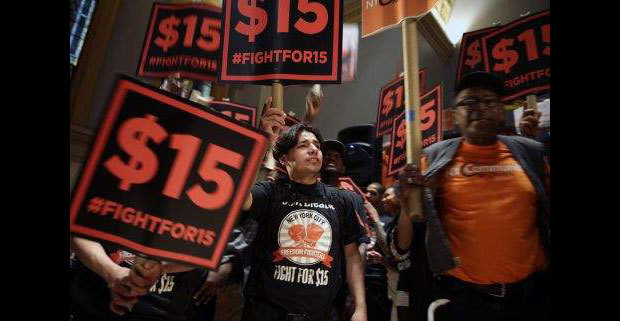Higher minimum-wage proposals gain ground on both coasts

By Lisa Leff And David Klepper, Associated Press
SAN FRANCISCO (AP) — The push for a higher minimum wage gained momentum on both sides of the country Wednesday, with New York embracing an eventual $15 an hour for the state’s 150,000 fast-food workers and the huge University of California system announcing the same raise for its employees.
“How we support our workers and their families impacts Californians who might never set foot on one of our campuses,” said UC President Janet Napolitano, who oversees 10 campuses, including UCLA and Berkeley. “It’s the right thing to do.”
The University of California becomes the nation’s largest public university to embrace the $15-an-hour wage that has become the rallying cry of many labor groups.
So far, Los Angeles, Seattle, San Francisco, Oakland and Berkeley have approved phased-in increases that eventually will take their minimum wage to $15 an hour, or about $31,200 for a full-time job. On Tuesday, Los Angeles County, the nation’s most populous county, voted to craft a law to do the same over five years.
In New York, the state Wage Board endorsed a proposal to set a $15 minimum wage for workers at fast-food restaurants with 30 or more locations. The increase would be phased in over three years in New York City and over six years elsewhere.
Gov. Andrew Cuomo’s administration has the final say, and Cuomo has signaled his support. New York would become the first state to take such a step for a specific industry. The state minimum wage is now $8.75 and is set to rise to $9 at year’s end.
Many workers say the increase would allow them to cope with the high cost of living, though restaurant owners say it will lead to higher prices and fewer jobs.
At the University of California, UC’s hourly wage earners — a group that includes students and full-time employees working in dining halls, dorms and bookstores or as gardeners, housekeepers and custodians at campuses and hospitals — currently make the state minimum of $9 an hour.
Napolitano said she will boost that to $13 in October for employees who work at least 20 hours a week and will raise it some more in stages to $15 by the fall of 2017.
UC has nearly 240,000 students and is California’s third-largest employer, with a staff of 195,000. About 3,200 UC employees and a much larger but undetermined number of people employed by outside contractors will receive the higher wage, UC said.
“I just thought it was important for a public university to plant the flag here for low-wage workers and a more livable wage,” said Napolitano, who was President Barack Obama’s homeland security secretary before she assumed leadership of the university nearly two years ago.
Napolitano’s plan does not need approval from the university’s governing Board of Regents.
The higher minimum-wage argument has gained traction amid concerns over the shrinking middle class and rising income inequality.
Supporters argue a higher wage floor will help lift the working poor into the middle class. Opponents warn businesses will have to raise prices, shed jobs or cut employees’ hours. Sixteen states have passed laws barring local governments from setting their own minimum wage.
Democrats, including presidential front-runner Hillary Rodham Clinton, have said they support a higher federal minimum wage, which is currently $7.25 per hour.
Vice President Joe Biden was scheduled to promote a higher minimum wage during a stop Wednesday at a washroom equipment manufacturer in Los Angeles.
Wal-Mart, the nation’s largest private employer, announced early this year that it is raising wages for a half-million employees to at least $10 an hour by next February.
Other public university systems around the country, including those in Washington state, Indiana and Tennessee, have adopted minimum wages higher than those set under state or federal law. But none have committed themselves to going as high as California.
University of California officials estimated that the raises for workers directly employed by UC will cost $14 million a year, a fraction of the system’s $12.6 billion annual payroll. UC said it also predicts contractors will pass some of the cost of higher wages onto the university.
The Republican leader of the California Assembly criticized the university’s plan to extend the higher wage to outside contractors.
“The university should be teaching engineering, not spending student dollars to practice social engineering by limiting who campuses can do businesses with,” Assemblywoman Kristen Olsen said.
Todd Stenhouse, a spokesman for the union that represents UC’s service workers, offered muted praise for Napolitano’s announcement. He complained that the university has been outsourcing jobs to private companies with less robust job protections.
“While it is a baby step in the right direction, it still leaves a permanent underclass of contract workers, and a first-class institution should not treat any of its workers as second-class,” he said.
[Source]: The Morning Journal


